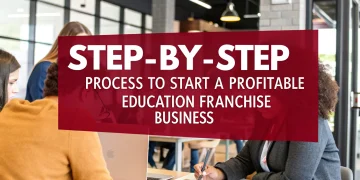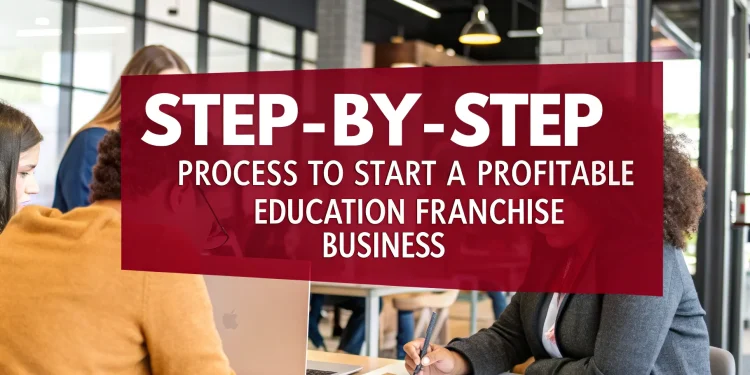Education Franchise Business is a sector that has a huge impact on the global economy. India’s massive youth population and high aspirations have made education a dynamic sector with strong demand in all segments. This includes preschools, K-12, test preparation, skills training, and vocational education. Entrepreneurs who are looking to make a meaningful contribution to society can benefit from a franchise education business.
This article will guide you through the detailed step-by-step procedure to launch your own franchise education franchise business. It also provides insights into market trends, industry growth, and operational structures. This guide is for entrepreneurs who are starting a business or first-time founders looking to get into the education sector.
Why choose an Education Franchise Business?
Franchises in the education industry allow aspiring entrepreneurs the opportunity to enter the market with a proven business model, recognizable branding, and a curriculum that is already established. An education franchise business is a great alternative to starting an educational center from scratch. It provides the blueprint, marketing strategy, and operational support needed to run a profitable center.
Education is also a stable industry that has a high demand. Franchise-based institutions are rapidly expanding in urban and semi-urban areas as parents invest more money into early childhood education, supplementary programs, and skill development.
View our Handbook on Education Business
Market Forecasts and Sector Growth
India’s education industry is expected to reach USD 225 billion by 2025. This will be driven by digital education, NEP 2020 Reforms, and an increasing emphasis on employability. The Education Franchise Business education model is a major contributor to this growth, especially in cities with limited access to quality education.
Segments like:
- Early childhood education and preschool
- Exam preparation and after-school tutoring
- Vocational Training and Skill Development
Approximately 15% to 20% of businesses are experiencing growth year-over-year. Franchisees are actively looking for partners who can duplicate their models in other regions. This opens up new opportunities for business owners.

How to Start an Education Franchise Business Step-by-Step
1. Find the right niche and franchise model
Start by selecting the area of education that you are most passionate about: preschool, K-12 coaching (including IT education), robotics, language or vocational education, or vocational education. Assess your skills and interests in the local market.
Research reputable franchise brands that operate in your niche. Examine their reputation, curriculum, and success stories. The best-performing franchises provide comprehensive support to new entrepreneurs.
2. Research local markets
Examine the educational needs in your area. Assess the competition and identify any gaps in services. A region that has a growing student population but few high-quality educational centers may have significant potential.
This step includes
- Understanding demographics (age group, income level, education needs)
- Analyze existing competitors (pricing and services, brand strength, etc.)
- Estimating the catchment areas for your proposed center
Related: Most Profitable Small scale Manufacturing business Ideas for Indian Startups
3. Franchises to be considered for shortlisting and evaluation
Contact the shortlisted franchisees to request brochures, agreements and detailed information. This phase involves reviewing critical aspects, such as:
- Structure of franchise fees and royalties
- Onboarding and training process
- Operating Guidelines and Brand Expectations
- Exclusive geographical exclusivity and marketing support
To understand the experiences of existing franchisees, ask them for feedback. You can then determine if the support provided by the franchisor is consistent and effective.
4. Finalize the location and infrastructure
The location is one of the biggest factors in determining success. Select a location that is safe, easily accessible and in compliance with local zoning laws. Franchisees specify infrastructure requirements, such as carpet area, classrooms and safety features.
A preschool, for example, may require 1000-2000 sq. A preschool may need 1000-2000 sq. Smart classrooms, libraries and computer labs may be required by a coaching institute.
5. Franchise Agreement
You will need to sign the franchise agreement once your application has been approved and the location is complete. This legally binding contract outlines both parties’ responsibilities, including:
- Duration of the Franchise
- Territorial rights
- Audits and quality control
- Brand names and trademarks
Before signing, it is highly recommended that the contract be reviewed by an expert in law.
6. Attend training and set up operations
Franchisers of repute provide training for you to understand business models, pedagogy and software systems as well as management practices. The training can be done at a corporate office or a center already in place.
Work on the physical center at the same time. This includes classrooms, branding material, recruitment of staff, uniforms and teaching tools. Franchisees will often provide a checklist for this stage.
7. Launch Your Center and Promote It
Once your business is operational, start local marketing activities to attract parents and students. Consider the following factors based on your audience and location:
- Door-to-door awareness campaigns
- Referrals and school tie-ups
- Online marketing (Google My Business, local SEO, Facebook Ads)
- Free demo classes or Inauguration Events
From Day 1, focus on delivering real value. Locally, your brand will be built by parent testimonials, student results, and word of mouth.
8. Quality Control is a must-have for day-to-day operations
Running an education franchise requires managing:
- Curriculum delivery and student performance
- Communication with parents and feedback
- Employee retention and training
- Education and brand standards
Franchisers provide support by way of audits, reviews of performance, refresher courses, and updated material. Be proactive to ensure quality standards are met consistently.
9. Track performance and scale
To measure success, use performance indicators like enrollment growth, student satisfaction, parent satisfaction and academic outcomes. As your center matures, explore:
- Expanding into new segments (e.g., from K-12 to preschool coaching)
- Opening a second location for a franchise
- Workshops, camps or programs with added value
Ownership of an Education franchise has many benefits
- From Day 1, you gain the trust and respect of students and parents.
- Profitable business model: reduces risks and accelerates the time to profitability.
- You get full support from teacher training to lead generation.
- You are contributing to the development of skills and nation-building.
Related: How to Start an Education Franchise Business
Manufacturing and Operations for Education Franchise
Education franchises do not involve the traditional manufacturing of products, but they have structured operations. They include:
- Curriculum Development: Lesson plans, assessments, and standardised teaching materials.
- Technology Systems: Student Information Systems, Learning Management Systems, online exam platforms.
- Infrastructure planning: Design of classroom layouts, safety equipment and brand-specific aesthetics.
- Staff Recruitment and training: Hire certified teachers, and provide them with franchisor-guided pedagogy.
It is crucial to manage these operational components effectively in order to maintain smooth service and consistency at all franchise locations.
How NPCS can help
Niir Project Consultancy Services prepares detailed techno-economic feasibility reports that assist entrepreneurs in making informed decisions about starting a business. The reports contain detailed process outlines and information on raw materials required, plant layouts, and financials. NPCS is a vital tool for startups and industrialists to evaluate the feasibility of launching a new venture, such as education-based businesses.
Find Best Idea for Yourself With our Startup Selector Tool
Final Thoughts
A franchise education business can be a lucrative venture with a positive social impact. The time is right for this sector, with the rising demand in India for quality education.
But success in this industry requires more than capital. It requires passion for learning, commitment to quality and a willingness to engage your community. You can create a sustainable business by leveraging the expertise of firms such as NPCS and partnering with a franchisor that shares your passion for learning, ensuring quality, and engaging in community engagement.


















